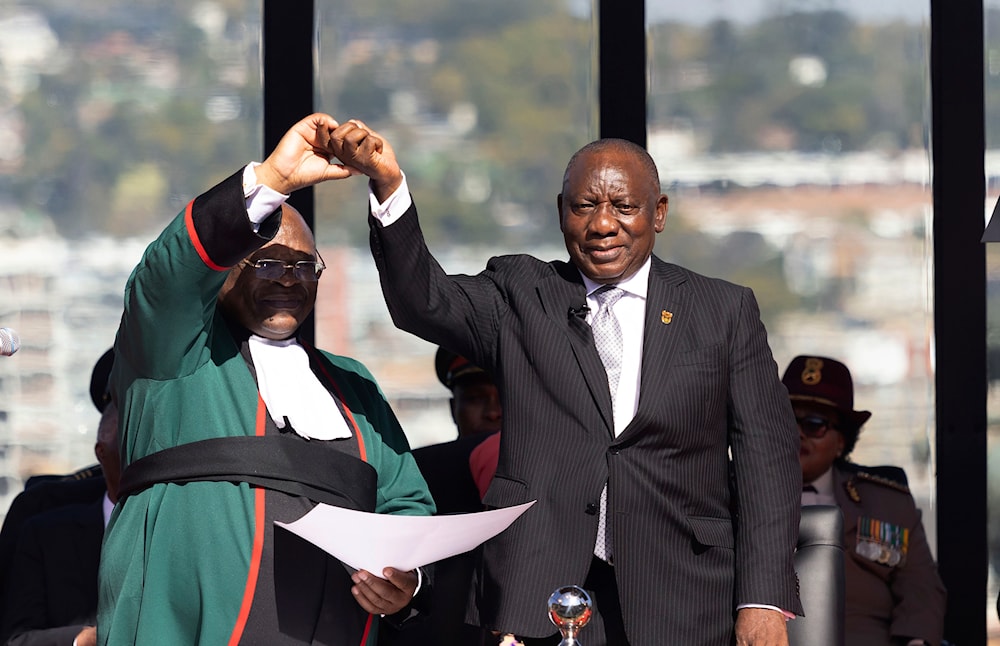Ramaphosa announces new South African gov. with long-term rivals
South Africa has a new coalition government formed of 32 portfolios, 12 of which have been awarded to previous opposition parties.
-

South Africa's Cyril Ramaphosa is sworn in as President by Chief Justice Raymond Zondo, left, at his inauguration at the Union Buildings in Tshwane, South Africa, on June 19, 2024. (AP)
South African President Cyril Ramaphosa announced the formation of a new government with historical opposition parties receiving 12 out of 32 portfolios after coalition negotiations between the African National Congress (ANC) party and others were successful.
In the most recent elections held in late May this year, it became clear that the ANC will no longer hold an outright parliamentary majority, pushing the party to search for new partners to form a coalition government. The second largest party, the Democratic Alliance (DA), a historical rival of the ANC, became an unlikely candidate to secure a coalition government.
In this most recent formula, the ANC will retain key cabinet positions, including key ministries such as foreign affairs, finance, defense, justice, and police.
From the 32 ministerial positions, the DA will hold six, including home affairs, environment, and public works.
DA leader John Steenhuisen was appointed Minister of Agriculture.
Other smaller parties and the Zulu nationalist Inkatha Freedom Party (IFP) received six ministerial positions, which include land reform, correctional services, sports, tourism, and public service.
"The establishment of the Government of National Unity in its current form is unprecedented in the history of our democracy," Ramaphosa said, speaking from Pretoria in a televised speech.
"The incoming government will prioritize rapid, inclusive, and sustainable economic growth and a creation of a more just society by tackling poverty and inequality as well as unemployment," he stressed.
Read more: Zuma's rising MK Party to join South African opposition
ANC splinter parties form unprecedented opposition
On the other hand, ANC splinter parties' participation in this year's election has formed a new and unprecedented South African opposition.
South Africa's uMkhonto we Sizwe (MK) Party joined an alliance of opposition parties in parliament, following the results of decisive elections. Although leading opposition parties such as MK Party and the Economic Freedom Fighters (EFF) have their roots in the ANC, the parties have starkly set themselves apart due to past in-party disputes that led to the formation of MK and EFF.
Previously, the ANC, led by President Ramaphosa, and the DA have been rivals, with the DA leading the opposition from 1999 until the 2024 elections. On the other hand, the ANC, coming out of the South African revolution led by Nelson Mandela, has held a near majority position in the South African National Assembly since 1994.
However, this year, the ANC suffered a resounding setback of 71 seats in the National Congress, forcing it to form a coalition government with the DA.
MK Party to lead opposition against 'white-led unholy alliance'
MK Party has also boycotted the first sitting of the National Assembly on Friday, after filing a complaint at the country's top court, alleging vote-rigging, which the court dismissed at a later time.
MK spokesperson Nhlamulo Ndhlela told reporters that the party would join the alliance called the Progressive Caucus, which includes the Marxist EFF and the center-left United Democratic Movement.
This alliance commands close to 30% of the seats in the National Assembly, Ndhlela said, sitting next to Zuma and the leaders of several smaller parties in the Assembly.
"This united effort is necessary because the 2024 election has also resulted in the consolidation of right-wing and reactionary forces who are opposed to economic freedom, radical economic transformation, racial equality, and land repossession," he said.
On his part, Zuma said that the unity government is "meaningless", calling it a "white-led unholy alliance."
Ndhlela said that MK had decided to take up its seats in the National Assembly after receiving legal advice and that it would continue to raise its allegations of a rigged election in parliament and in courts.
Read more: South Africa's ANC eyes unity gov. after losing assembly majority

 4 Min Read
4 Min Read








